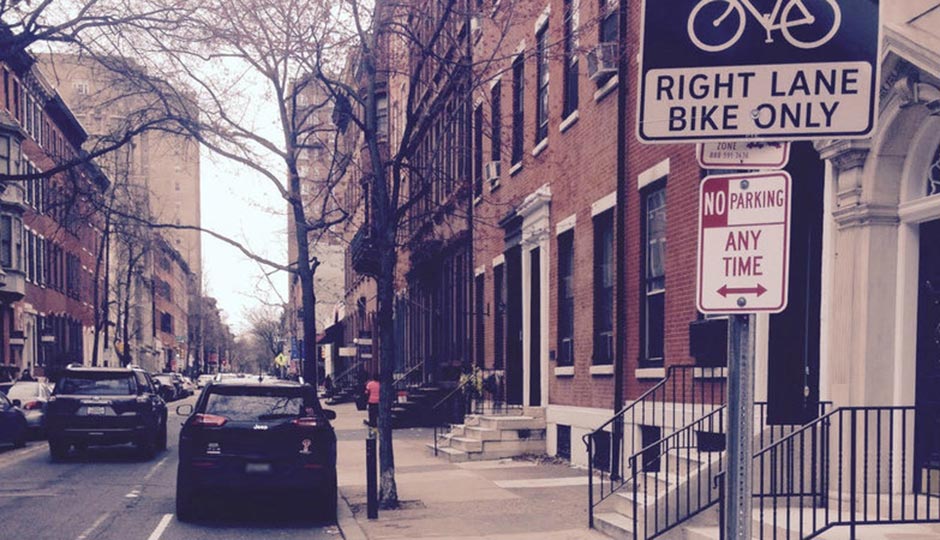Philly Cyclist’s Petition Against Parking in Bike Lanes Racks Up Nearly 1,000 Signatures

Photo | Travis Arterburn’s Change.org petition.
Can’t we all just get along? Can’t cars and bicycles maintain a symbiotic relationship on Philly’s streets? Apparently not.
About a month ago, Travis Arterburn — who works for food delivery service Caviar — started a Change.org petition lobbying the city of Philadelphia to enforce laws that prohibit cars from parking in clearly marked bike lanes. Here’s Arterburn’s beef: On Sundays, cars routinely park in the bike lanes on Spruce, Pine and 13th streets — the only such lanes that cut through Center City — and he says the PPA and PPD have ignored the violations.
How could this be allowed? Well, several religious institutions in Center City — like churches and synagogues — have an informal agreement with the city that allows cars to use the right travel lanes as parking during services, and the deal predates the installation of the bike lanes.
Arterburn created his petition purely as an outlet for his frustration with having to weave around parked cars in his path, he says, but he also wanted to get the attention of the Philadelphia Parking Authority. He had no idea if the petition would become popular, or if a significant number of people would even see it, but it has racked up nearly 1,000 electronic signatures to date, although the number has recently plateaued.
“Center City drivers park in the bike lanes on 13th Street, Spruce Street, and Pine Street every Sunday,” Arterburn’s petition reads. “There are signs up and down all three of these lanes that read ‘No Parking at Any Time.” For some reason it has become the norm for drivers to ignore these signs on Sundays. The PPA and Police are also failing to enforce them.”
Although he didn’t know about it when making the petition, Arterburn says he is now aware of the agreement allowing cars to park in the bike lanes, but he’s not satisfied. “To be honest, it doesn’t make sense to me in any circumstance,” Arterburn said. While the bike lanes on Spruce, Pine and 13th streets are some of the only ones in Center City, church service goers can use public transportation, he figures.
“This is all day long on Sundays,” Arterburn said, noting that the agreement isn’t only creating inconveniences for cyclists for a short period one day each week. Cars blocking the lane specifically designated for cyclists is not simply inconvenient, Arterburn says, but it’s also a safety issue.
“These arterial bike lanes are very important for cyclists that are traveling through downtown Philadelphia,” the petition says. “They are rendered completely useless and dangerous when cars park in them and force cyclists to weave in and out.”
Arterburn says he hasn’t had any terribly close calls when veering into traffic to avoid parked cars, but he fears it could be a serious problem for novice riders. Given the popularity of Indego bike share, it’s likely that there are more inexperienced cyclists on the streets than when the city first gave cars permission to block bike lanes during services.
In a letter from 2010, the City of Philadelphia’s then-Pedestrian and Bicycle Coordinator Charles Carmalt explained why the city allows cars to park in the bike lanes: it’s a way of supporting the institutions and reducing the demand for parking.
The current Pedestrian and Bicycle Coordinator Jeannette Brugger said she is aware of Arterburn’s petition and confirmed that the agreement between the city and its religious institutions is still in place. In terms of the safety issues the agreement creates, Brugger said the city is still looking into the best way forward.
“The City continues to evaluate conditions to ensure streets operate safely,” Brugger said in an email.
Sarah Clark Stuart, executive director of the Bicycle Coalition of Greater Philadelphia, sees two steps that the city should take to better accommodate both religious service goers and cyclists.
First, she believes there needs to be proper signage on the streets where parking in bike lanes occurs, alerting both cyclists and drivers about when parking is allowed and for how long.
Secondly, Stuart thinks enforcement of bike lane parking needs to be stricter when services are not going on, thereby reducing the number of people who try to abuse the arrangement with religious institutions. “It’s not working perfectly, and it could be working a lot better,” she said.
Since the agreement predates the installation of the bike lanes, allowing cars to park for services is something that needed to remain if the bike lanes were to be created at all, Stuart said.
It’s hard to say that the PPA is blind to the problem of cars blocking bike lanes. In December 2013, it launched the hashtag #UnblockBikeLanes, which gave people the ability to report illegally parked cars on Twitter, aiming to free up the lanes when they weren’t being used for service parking. As of last May, 270 instances of blocked bike lanes had been reported using the hashtag. Clearly, though, Arterburn and other cyclists believe something must be done about the Sunday problem as well.
With the support of almost 1,000 Philadelphians behind him, Arterburn hopes to team with City Council members to enact some change in how authorities aim to create harmony between cars, bikes and religious services.
The PPA did not respond to requests for comment.
Follow @BrettMKlein on Twitter.


